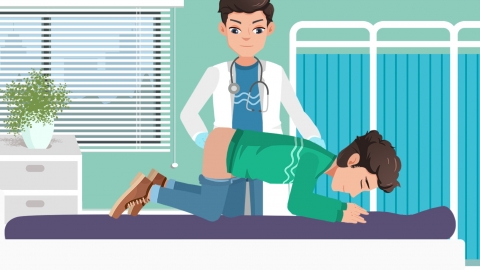How to Prevent Recurrence of External Hemorrhoids
Generally, the recurrence of external hemorrhoids may be caused by prolonged sitting or standing, poor bowel habits, anal sphincter relaxation, perianal infection, proctitis, and other factors. Recurrence can be prevented through physical methods, medications, and under a doctor's guidance. If discomfort occurs, timely medical consultation is recommended. The detailed explanations are as follows:

1. Prolonged Sitting or Standing
Maintaining the same posture for extended periods, such as sitting or standing, can hinder pelvic blood circulation, cause venous congestion, and increase pressure in the venous plexus of the anal and rectal areas, thereby forming or worsening hemorrhoids, including external hemorrhoids. Regularly change positions, get up and move for 5–10 minutes every hour, and perform simple stretching exercises to promote blood circulation.
2. Poor Bowel Habits
Excessive straining, prolonged defecation, or irregular bowel movements can increase pressure in the anal and rectal regions, obstruct venous return, and predispose to external hemorrhoids. Develop regular bowel habits, maintain smooth bowel movements, and prevent constipation. Avoid excessive straining during defecation; instead, relax the body using deep breathing to reduce anal pressure.
3. Anal Sphincter Relaxation
Anal sphincter relaxation may be associated with aging, chronic diarrhea or constipation, childbirth, and other factors. Relaxed sphincters result in incomplete anal closure, making the venous plexus prone to congestion and dilation, thus forming external hemorrhoids. Symptoms such as fecal incontinence and anal dampness may also occur. Under a doctor's advice, medications such as potassium permanganate solution, hemorrhoid suppositories, and diosmin tablets may be used to treat and prevent infection and recurrence.
4. Perianal Infection
Perianal infections are typically caused by bacterial invasion of the perianal skin or mucosa, commonly occurring during anal injury or immune system decline. Infection leads to local congestion, swelling, and impaired venous return, making external hemorrhoids more likely. Symptoms such as redness, swelling, heat, pain, and increased secretions may also appear. Follow medical advice to use medications such as erythromycin ointment, amoxicillin capsules, and cefradine capsules to alleviate discomfort. Additionally, consume more vegetables daily to prevent recurrence.
5. Proctitis
Proctitis may be caused by pathogenic infections (such as bacteria, viruses, fungi) or autoimmune responses. Rectal inflammation leads to congestion and edema of the rectal mucosa, obstructing venous return and predisposing to external hemorrhoids. Symptoms such as abdominal pain, diarrhea, and bloody stools may also occur. Under a doctor's guidance, medications such as mesalazine suppositories, metronidazole tablets, and sulfasalazine enteric-coated tablets can be used to improve symptoms. Enhancing physical health and boosting immunity can help prevent recurrence.
To prevent the recurrence of external hemorrhoids, it is recommended to improve lifestyle habits, avoid prolonged sitting or standing, and maintain regular bowel habits. Additionally, regularly clean the perianal area to prevent infection.








